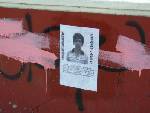by Luciente Zamora & Nina Armand
Tuesday, Dec. 26, 2006 at 1:17 PM
oaxaca_voices@yahoo.com
Just as arbitrarily as she’d been grabbed off the street on the 25th, she was told that she was going home. She can’t stop thinking about the women she left behind.
Before, Magdalena hadn’t given much thought to the people’s struggle. Her experience has affected her profoundly. She says after what the government has done to her she wants to participate in the struggle however she can.

preso_politico.jpglio4vg.jpg, image/jpeg, 150x113
Primer Informe: Oaxaca December 18, 2006
Contrasted against the blue sky, the red noche buenas blooming throughout the city along with the sounds of women cooking and children playing in the marketplace make the center of town seem almost . . . normal. Oaxaca and its people is not the same place it was before the people stood up in June of this year. The fact that for months the people raised their heads from throughout Oaxaca—from the center region and through much of the countryside—cannot be erased. Oaxaca demanded to be heard.
* * * * *
On Sunday, December 17, 43 prisoners who had been detained in a prison in Tepic, Nayarit were released. Immediately upon their arrival back to Oaxaca City, many of the people released began sharing stories of the November 25th repression where more than 150 people were brutally beaten and arrested in the area around the zocalo after a protest and while many people were coming home from work and shopping.
Magdalena was coming home from work on the afternoon of the 25th. She’s a 50-year-old widow and works as a housekeeper to support her family. She had heard of the popular movement, but didn’t really know too much about it. She remembered some of her neighbors telling her that the teachers were just troublemakers and that it was time for the authorities to bring down order. But on the 25th everything changed. She was swept up along with many others by the PFP while she was in the town center. She was hit, thrown down on the floor, had her hands tied and told—along with other women—that they were going to die and that after they were killed their bodies would be thrown in garbage cans where nobody would find them.
Magdalena saw her relatives bloodied and beat up. For the 21 days she was in prison, she and the others arrested that day had no contact with the outside world. For Magdalena, what is burned into her consciousness is the desperation of the women prisoners who don’t know where their children are and whether or not they are eating. Just as arbitrarily as she’d been grabbed off the street on the 25th, she was told that she was going home. She can’t stop thinking about the women she left behind.
Before, Magdalena hadn’t given much thought to the people’s struggle. Her experience has affected her profoundly. She says after what the government has done to her she wants to participate in the struggle however she can. She now remembers the repression against the people of Atenco and never would have believed she’d find herself identifying with the women who were brutalized there. She is most of all driven by an urgency to free the prisoners who remain in the conditions she’s just escaped, and she says that though she can’t read or write she wants to be involved in whatever way she can. She says she doesn’t seek to be rich and live in a mansion like URO, but she demands respect and a more just world—not just for herself, but for everyone.
* * * * *
The air is still thick in Oaxaca. In the past weeks helicopters occasionally fly low—their blades a reminder of the brute force of the state. Officially the PFP forces have withdrawn from the city, but there are still eyes and ears everywhere. Just last night Florentino Lopez, Pedro Garcia, and Macario Padilla, prominent figures in the APPO movement were detained at a stoplight and were beaten and arrested. They were released the same night—but the threat of more repression is clear, as is determination on the people’s side.

